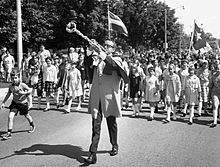Bobby Gimby
| Bobby Gimby | |
|---|---|

Bobby Gimby as The Pied Piper
|
|
| Background information | |
| Birth name | Robert Stead Gimby |
| Born |
October 25, 1918 Cabri, Saskatchewan, Canada |
| Died | June 20, 1998 (aged 79) North Bay, Ontario, Canada |
| Genres | Pop |
| Occupation(s) | Musician, songwriter, bandleader |
| Instruments | Trumpet |
Bobby Gimby, CM (October 25, 1918 – June 20, 1998) was a Canadian orchestra leader, trumpeter, and singer-songwriter.
He was born Robert Stead Gimby (pronounced Jim-bee) in Cabri, Saskatchewan, a small town of about 300 people. He came from a musical family: his father Albert S. Gimby played fiddle, his mother played piano, and his sister played guitar. His father ran a hardware store, but after it burned in a fire the family struggled financially. They left Saskatchewan to live near relatives in British Columbia. The family moved to Chilliwack, B.C., where they lived throughout the 1930s, and where Gimby attended Chilliwack High School.
In Chilliwack he was a member of the Town Band, a popular group which played at local dances. In 1941, he joined the touring orchestra of Canadian bandleader Mart Kenney. He played trumpet (the press of that time referred to him as "The Wizard of the Trumpet") and he went on the road with Mart Kenney's Western Gentlemen, working mainly in Vancouver and western Canada.
Around 1944, Gimby moved to Toronto. He founded his own band and became popular playing for teenagers. Thanks to his sponsor, the Simpson's store, he was able to entertain at various teen events during the mid-1940s. In the late 1940s, he and his band made several recordings. In 1945, he became a member of the long-running radio program the Happy Gang. He remained with the Gang for thirteen years, until April 1959. In 1949, he was given his own program on CBC Radio; his band at that time was called the Rodeo Rascals. In addition to continuing to lead his own orchestra, Gimby later appeared on CBC Television in the late 1950s and hosted a show on CTV in the mid-1970s. On that show, he concentrated on big band and pop songs that would appeal to viewers who remembered him from the 1940s and 1950s.
In the early 1960s, Gimby was working as a songwriter; he also worked for an advertising agency, writing jingles for commercials. In 1962, while in Singapore on business, he wrote a patriotic song about the impending independence of the country. It was called "Malaysia Forever" and it celebrated the formation of Malaysian Federation in 1963. The song became very popular, spurred by frequent radio play, and was thought of as the new country's first national anthem.
...
Wikipedia
